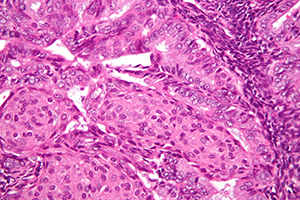Highest Death Rates for Uterine Cancer Among Non-Hispanic Blacks: Behavior or Biology?
While the incidence of many cancer types is decreasing, endometrial cancer—a type of cancer that begins in the uterus and is also known as uterine cancer—is on the rise in the United States.

Very high magnification micrograph of endometrioid endometrial adenocarcinoma. H&E stain. Endometrioid endometrial adenocarcinoma is the most common form of endometrial cancer.
A study published in a recent issue of Cancer Epidemiology, Biomarkers & Prevention, a journal of the American Association for Cancer Research (AACR), explored whether increasing incidence and mortality rates associated with uterine cancer were evenly distributed among various races and ethnicities.
Using data from the National Cancer Institute’s Surveillance, Epidemiology, and End Results program, researchers found that non-Hispanic blacks had significantly higher incidence rates of aggressive endometrial cancer compared with non-Hispanic white women.
Risk factors for endometrial cancer include obesity and diabetes. In the United States, non-Hispanic black and Hispanic women have the highest prevalence of obesity and diabetes. Researchers in this study, however, noted that Hispanic women do not share the same rates of mortality from uterine cancer as non-Hispanic blacks. They concluded that biology may be a contributing factor—some molecular differences in non-Hispanic black women’s tumors that may make them more aggressive.
Michele L. Cote, PhD, associate professor of oncology at the Barbara Ann Karmanos Cancer Institute and Wayne State University School of Medicine in Detroit and an author of the study, commented on the findings in the winter issue of Cancer Today, the quarterly magazine for cancer patients, survivors, and caregivers published by the AACR. “You would think that if these [were factors], then you would see [higher mortality] in Hispanic women too,” she says. “And we didn’t.”
Cote and colleagues cite other research in the Cancer Epidemiology, Biomarkers & Prevention article as showing that non-Hispanic black women experience an 80 percent higher mortality rate after an endometrial cancer diagnosis compared with non-Hispanic white women, and that 86 percent of non-Hispanic white women compared with 64 percent of non-Hispanic black women live five years or longer after their diagnosis.
Read more details about the study and learn about the signs and symptoms of uterine cancer.



